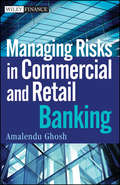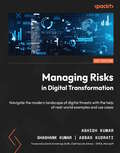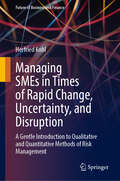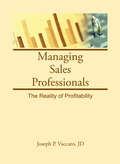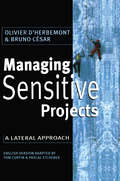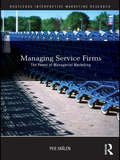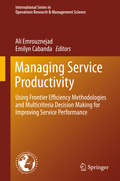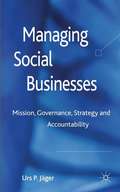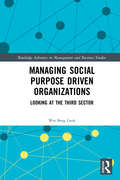- Table View
- List View
Managing Risk: Scanning the Hazy Horizon
by Harvard Business Review PressHedging risks during the project planning process helps to mitigate those risks later on. Built into every project plan are certain assumptions about time, money, and performance of team members. Although it is impossible to avoid some risk, this chapter shows that crafting a strong management framework makes it easier to deal with unforeseen adverse developments as they arise.
Managing Risk: The HR Contribution
by John Stevens Vicki Jeynes Elvis Cotena Mark EdelsonThis handbook is a one-stop guide that sets out a strategic approach for understanding and managing HR risks. Managing Risk: The HR Contribution will enable the user to understand how managing HR risks will benefit their organisation. It will also assist the user to put into place a practical strategy for managing risks associated with employees from recruitment through to the close of the employee/employer relationship.This book will be of particular interest to organisations looking for a strategic, integrated approach linked to business risk management and corporate governance.
Managing Risk: Which IT Risks Are Worth Taking?
by Robert D. Austin Richard L. Nolan Shannon O'Donnell"The Adventures of an IT Leader" invites readers to "walk in the shoes" of Jim Barton, the new CIO of the fictional IVK Corporation, as he spends a difficult year learning effective information technology leadership, sidestepping the pitfalls that make the CIO job the most volatile, high-turnover job in the business. After several months of both turmoil and improved performance for the fictional IVK Corporation, Barton sits down with his CEO to discuss options for risk management and reduction. Although a company can never be sure of complete protection against risk, they consider the costs and benefits of different approaches. This chapter is excerpted from "The Adventures of an IT Leader."
Managing Risks In The European Periphery Debt Crisis
by George ChristodoulakisThe European Periphery Debt Crisis (EPDC) has its roots in the structural characteristics of the individual economies affected. This book offers a full diagnosis of the EPDC, its association to the national and international structural characteristics and a full analysis from a risk management point of view of the available policy options.
Managing Risks in Commercial and Retail Banking
by Amalendu GhoshA practical guide to the practices and procedures of effectively managing banking risks Managing Risks in Commercial and Retail Banking takes an in-depth, logical look at dealing with all aspects of risk management within the banking sector. It presents complex processes in a simplified way by providing real-life situations and examples. The book examines all dimensions of the risks that banks face--both the financial risks--credit, market, and operational--and the non-financial risks--money laundering, information technology, business strategy, legal, and reputational. Focusing on methods and models for identifying, measuring, monitoring, and controlling risks, it provides practical advice backed up by solid theories, without resorting to the use of complicated mathematical and statistical formulas. Author Amalendu Ghosh exposes topics that are usually absent in books on managing banking risk--such as design of control framework, risk management architecture, credit risk rating, risk-based loan pricing, portfolio analysis, business continuity planning, and corporate governance. Author has extensive experience with a variety of major banks and institutions worldwide and brings a fresh perspective in the wake of the global finance crisis Presents a novel approach using models of the credit risk rating of different types of borrowers, the methodology for assigning weights for deriving the rating, and the scoring process Covers the essentials of corporate governance and options for credit risk assessment in line with the recommendations made in the New Basel Capital Accord Explains the methodology of risk-based internal audit, including techniques to enable bank branches to switch over from the old transaction-based audit methods With its logical sequence of the aspects of risk management, the book's layout is ideal for presentations, making it a handy tool for risk management training
Managing Risks in Digital Transformation: Navigate the modern landscape of digital threats with the help of real-world examples and use cases
by Ashish Kumar Shashank Kumar Abbas Kudrati Sarah Armstrong- SmithSecure your business in a post-pandemic world: Master digital risk identification and defensePurchase of the print or Kindle book includes a free PDF eBookKey FeaturesBecome well-versed with sophisticated system-level security risks and the zero-trust frameworkLearn about remote working risks, modern collaboration, and securing the digital data estateKeep up with rapidly evolving compliances and regulations and their impact on cyber risksBook DescriptionWith the rapid pace of digital change today, especially since the pandemic sped up digital transformation and technologies, it has become more important than ever to be aware of the unknown risks and the landscape of digital threats. This book highlights various risks and shows how business-as-usual operations carried out by unaware or targeted workers can lead your organization to a regulatory or business risk, which can impact your organization's reputation and balance sheet.This book is your guide to identifying the topmost risks relevant to your business with a clear roadmap of when to start the risk mitigation process and what your next steps should be. With a focus on the new and emerging risks that remote-working companies are experiencing across diverse industries, you'll learn how to manage risks by taking advantage of zero trust network architecture and the steps to be taken when smart devices are compromised. Toward the end, you'll explore various types of AI-powered machines and be ready to make your business future-proof.In a nutshell, this book will direct you on how to identify and mitigate risks that the ever- advancing digital technology has unleashed.What you will learnBecome aware of and adopt the right approach to modern digital transformationExplore digital risks across companies of all sizesStudy real-world cases that focus on post-pandemic digital transformationUnderstand insider threats and how to mitigate vulnerability exploitationGet to know how cyberwarfare targets infrastructure and disrupts critical systemsDiscover how implementing a regulatory framework can safeguard you in the current and future data landscapesWho this book is forThis book is for three categories of readers—those who own a business and are planning to scale it; those who are leading business and technology charters in large companies or institutions; and those who are academically or disciplinarily targeting cybersecurity and risk management as a practice-area.Essentially, this book is for board members, and professionals working in IT, GRC, and legal domains. It will also help technology leaders, including chief digital officers, chief privacy officers, chief risk officers, CISOs, CIOs, as well as students and cybersecurity enthusiasts with basic awareness of risks to navigate the digital threat landscape.
Managing Robotics in Retail: A Service Systems Perspective (Markt- und Unternehmensentwicklung Markets and Organisations)
by Patrick MeyerThis book answers the question of how to manage service robots in brick-and-mortar dominated retail service systems to allow for key stakeholders’ adoption and to foster value co-creation. It starts by demonstrating the scientific relevance of the topic as well as deriving a set of promising research questions. After introducing service-dominant logic as a theoretical research lens and elucidating service systems along with their underlying concept of value co-creation as relevant key concepts, five studies are presented. The author´s findings show that understanding and differentiating between consensus, shared and idiosyncratic drivers of and barriers to the adoption of service robots in retail service systems by all key stakeholders, i.e. customers, frontstage employees, and retail managers, is crucial to be able to fully cope with the complexity inherent in the adoption of service robots in service organizations. Moreover, the designed and evaluated artifact fosters a paradigm shift from a one-time technology introduction to a continuous technology management approach including iterations of experimenting, piloting, and implementing.
Managing SMEs in Times of Rapid Change, Uncertainty, and Disruption: A Gentle Introduction to Qualitative and Quantitative Methods of Risk Management (Future of Business and Finance)
by Herfried KohlIn an era of rapid technological change and growing uncertainties, this book equips managers and engineers with vital risk management tools. Addressing challenges such as pandemics, supply chain disruptions, and political tensions, it blends qualitative and quantitative approaches to modern risk management. The first half explores enterprise risk management, including business continuity, compliance, and crisis management. The second half focuses on quantitative methods, featuring a mathematical bootcamp on probability, statistics, and Monte Carlo simulations, with detailed case studies. Designed for beginners and intermediate professionals, it also benefits students seeking a comprehensive overview of risk management. The book draws on the author's extensive experience as a manager, trainer, and auditor, offering practical, tested solutions. While tailored to the needs of SMEs, the concepts are applicable to all organizations. This book stands out for its balanced treatment of both qualitative and quantitative aspects, providing numerous examples and complete solutions for practice.
Managing Sales Professionals: The Reality of Profitability
by William Winston Joseph P VaccaroThis book is designed for sales managers as they make decisions and solve problems on a day-to-day basis. Managing Sales Professionals provides readers with specific details and illustrates how to plan, organize, staff, operate, and evaluate a sales force and its activities. This book offers an approach that is practical and realistic--one that is needed by sales managers who want to oversee a successful sales staff.The author, Joseph Vaccaro, uses an “integrated model” approach. He integrates the marketing mix as it relates to selling, and then he delves into the daily situations and problems readers encounter as practicing sales managers. With cases at the end of each chapter that make the chapter material come to life, Managing Sales Professionals is a practical tool for those in the world of marketing and sales management. It is a realistic, pragmatic, practical, how-to approach that explains complex concepts in a clear and concise manner. Vaccaro avoids generalities, and he cuts right to the critical specifics for sales managers in the real world.Terms and concepts are clearly defined, and each chapter concludes with penetrating questions to further develop your sales management skills. Along with a highly pertinent chapter on legal and ethical aspects in selling, Managing Sales Professionals covers:how to recruit salespeoplemotivation proceduresgender and racial diversity of the sales forcehow to plan and conduct a training programeffective selling techniqueshow to develop brand awarenessnew sales technologyhow to determine pricing and discount policiescompensation policieshow to determine transportation policiescontrol and evaluation procedureshow to effectively interact with marketingAnyone looking to increase sales, such as business owners, consultants, marketing professionals, and practicing salespeople and sales managers, can use this book to examine their sales staffs and look for areas in which to improve. Managing Sales Professionals is also ideal for upper level undergraduate students as they learn the basics of how to sell, organize, and run a sales force.
Managing School Intellectual Capital for Strategic Development: Lessons from Asia and Europe (Asia-Europe Education Dialogue)
by Eric C. K. ChengCheng articulates the extent to which knowledge management approaches can create intellectual capital (IC) and contribute to improvements in education quality. He argues that public schools have long contended with the requirements of quality assurance in a competitive environment of decreasing student numbers, increasing parental choice and rising standards of accountability. As public organizations, schools have to demonstrate appropriate resource management and show evidence that they are meeting defined development plans and goals. Cheng proposes a strategic approach, Intellectual Capital management, to help schools respond to and cope with the increasingly competitive environment while enhancing school capacity for improving student learning. First, the book guides readers to understand the development of IC theory in the context of education to address the requirements of quality assurance and accountability. It then introduces Lesson Study, e-Learning and ICT as key resources and drivers for building school IC, and examines the organisational factors that enable knowledge management approaches for developing IC in schools from both Asia and Europe. It concludes by offering strategies and implementation methods to manage school IC for sustainable development. Combining research from Asia and Europe, this edited volume will be useful for school leaders and policy makers, as well as those researching school leadership and intellectual capital.
Managing Science
by Frederick BetzWhat is science? How is it performed? Is science only a method or is it also an institution? These are questions at the core of Managing Science, a handbook on how scientific research is conducted and its results disseminated. Knowledge creation occurs through scientific research in universities, industrial laboratories, and government agencies. Any knowledge management system needs to promote effective research processes to foster innovation, and, ultimately, to channel that innovation into economic competitiveness and wealth. However, science is a complicated topic. It includes both methodological aspects and organizational aspects, which have traditionally been discussed in isolation from each other. In Managing Science, Frederick Betz presents a holistic approach to science, incorporating both philosophical and practical elements, in a framework that integrates scientific method, content, administration and application. Illustrating all of the key concepts with illustrative case studies (both historical and contemporary, and from a wide spectrum of fields), Betz provides in-depth discussion of the process of science. He addresses the social, organizational, institutional, and infrastructural context through which research projects are designed and their results applied, along the path from experimentation to innovation to commercialization of new products, services, and processes. This practical approach to science is the foundation of today's knowledge-intensive and technology-enabled industries, and positions the management of science within the broader context of knowledge management and its implications for organizations, industries, and regional and national technology management policies. Managing Science will be an essential resource for students in all areas of research, industry scientists and R&D specialists, policymakers and university administrators, and anyone concerned with the application of research to economic growth and development.
Managing Scientists: Leadership Strategies in Research and Development
by Alice M. SapienzaIn today's climate of enormous scientific and technological competition, it is more crucial than ever that scientists' involvement in research and development be managed well.
Managing Segway's Early Development
by David Kiron Richard G. HamermeshDescribes the early development of the Segway Human Transporter and focuses on the organizational issues that arise between the parent company and the new company that is being spun out to produce and market the Segway. Key issues are the distribution of bonuses and stock options.
Managing Selling and the Salesperson
by Frank V. CespedesWritten for a module in the Marketing Implementation course (a second-year elective in the MBA program). Provides a brief introduction to common issues involved in recruiting, training, compensating, and evaluating field salespeople. Also offers questions to consider concerning these topics in case analysis.
Managing Sensitive Projects: A Lateral Approach
by Olivier D'Herbemont Bruno CesarEvery day, managers must adapt to rapidly changing markets and situations. This book deals with sensitive or difficult projects, ranging from redundancy programs to disposal of radioactive waste, from the launch of a new product to the introduction of a new computer system. The authors use a revolutionary way to manage sensitive projects--the lateral approach. Derived from twenty years' experience working with managers, the lateral approach is a flexible and non- confrontational method that introduces change through an understanding of how people think and act. While communities and organizations often resist change even though they will benefit from it, this approach shows how projects can be successfully managed.
Managing Service Firms: The Power of Managerial Marketing
by Per SkålénBased on a conceptual analysis of marketing texts, particularly service marketing texts, and a case study of a service firm that utilizes approaches to managing organizations that have been developed within the boundaries of marketing, this book presents a critical examination of marketing as a managerial practice. Skålén focuses in particular on the managerial research tradition and managerial practice referred to as service marketing (sometimes service management), which is seen as a ‘dominant managerial logic’ by many marketing scholars. Skålén analyzes the governmentality of service marketing through textual representations of managerial marketing and a case study of a service organization. Based on the former, the author argues that managerial marketing has always promoted and fostered customer orientation as the main governmental rationality and that this rationality in service marketing targets human beings more exclusively than previously. This book contributes to critical marketing research since this research tradition lacks studies of empirical responses to managerial marketing which articulate a radical social critique.
Managing Service Food And Beverage Operations
by Ronald Cichy Philip HickeyManaging Service in Food and Beverage Operations shows students how food service professionals create and deliver guest-driven service; enhance value, build guest loyalty, and promote repeat business; and continuously improve the process of providing excellent service. Students will learn how every aspect of a food service operations contributes to the guest experience and will explore unique features of a variety of food and beverage operations.
Managing Service Productivity
by Ali Emrouznejad Emilyn CabandaThis volume describes how frontier efficiency methodologies such as Data Envelopment Analysis (DEA) and other techniques such as multi-criteria decision making can help service industries to improve their performance by providing a ranking of best-practice efficient service units and by identifying sources of inefficiency for each service unit. It explains how they can be used to determine potential improvement targets for each of the inefficient service units, to identify peers for each service organization and to provide a basis for continuous performance improvement. Presenting applications in a variety of industries, this book will be useful for the service management to improve service productivity, profitability, sustainability and quality and effectiveness of service deliveries. A free trial version of the World's leading Data Envelopment Analysis Software (PIM-DEA) is available for readers of this book.
Managing Service, Education and Knowledge Management in the Knowledge Economic Era: Proceedings of the Annual International Conference on Management and Technology in Knowledge, Service, Tourism & Hospitality 2016 (SERVE 2016), 8-9 October 2016 & 20-21 October 2016, Jakarta, Indonesia & Vladimir State University, Vladimir, Russia
by Ford Lumban Gaol, Natalia Filimonova and Fonny HutagalungManaging Service, Education and Knowledge Management in the Knowledge Economic Era contains papers that were originally presented at the 2016 International Congress on Management and Technology in Knowledge, Service, Tourism & Hospitality (SERVE 2016), held 8-9 October 2016 & 20-21 October 2016, in Jakarta, Indonesia & at the Vladimir State University, Vladimir, Russia. The contributions deal with various interdisciplinary research topics, particularly in the fields of social sciences, education, economics and arts. The papers focus especially on such topics as language, cultural studies, economics, behavior studies, political sciences, media and communication, psychology and human development. These proceedings should be of interest to academics and professionals in the wider field of social sciences, including disciplines such as education, psychology, tourism and knowledge management.
Managing Smart
by Lynne Milgram, M.D., MBA Alan Spector, Ph.D., M.D. Matt Treger'Managing Smart' examines the challenges facing today's management and provides fast, practical answers for solving common workplace situations. It presents step-by-step instructions for mastering more than 300 key real-world management tasks. This condensed business guide includes information on: * Leadership techniques * Labor management * Strategic planning * Time management * Marketing and sales techniques * Career development * Key business concepts * Management tools * Information systemsAmong many other management topics, 'Managing Smart' also shows you how to: * Set project goals and priorities * Increase efficiency * Comply with employment and labor benefits * Manage financesManagement professionals and novices alike will improve their effectiveness, skills, and knowledge with these concise reference tips.
Managing Smart Cities: Sustainability and Resilience Through Effective Management
by Anna Visvizi Orlando TroisiThis book adopts the managerial perspective to the study of smart cities. As such, this book is a necessary addition to the existing body of literature on smart cities. The chapters included in this book prove the case that transformation of cities to smart cities is a function of effective and efficient management practices implemented at diverse levels of smart cities. While advances in information and communication technology (ICT) are crucial, it is the ability to apply ICT consciously and efficiently that drives the transformation of cities to smart cities in a manner conducive to cities’ sustainability and resilience.The book covers three sets of interconnected topics:Management and decision-making for urban design and infrastructure developmentManagement and decision-making in context of smart cities developmentWays of promoting and ensuring participation, representation and co-creation in smart cities These three groups of topics offer a great opportunity to acquire a clear, direct, and practice-driven knowledge and understanding of how effective management allows ICT-enhanced tools and applications to change smart cities, possibly making them smarter.
Managing Social Businesses
by Urs P. J�gerSocial businesses and non-profit organizations act at the interface of markets and civil societies. Their executives are challenged by issues of social mission and economic rationale. This book presents a new concept of social businesses and a framework for the mission and strategy-related decision making in this complex concept.
Managing Social Media and Consumerism
by RajagopalCategorically reviews the theories of communication, best practices in social media and previous research, and analyzes the corporate involvement towards strategic and tactical stewardship in serving customer-centric business requirements.
Managing Social Purpose Driven Organizations: Looking at the Third Sector (Routledge Advances in Management and Business Studies)
by Wee Beng GeokThe book examines the management of social purpose driven organizations in an Asian context, using the case study approach. It looks at these organizations during a period of major changes in the regulatory and governance environment for charities in Singapore. The focus is on how these changes impact the organizational and management issues confronting several charities and volunteer welfare organizations, an arts enterprise, a co-operative and a non-governmental organization in international disaster relief. Although diverse, the common denominator among these organizations is their commitment to a core social purpose. Issues examined include: organizational restructuring, crisis management, organizational change management, social entrepreneurship and organizational sustainability. The book adopts a systemic perspective in examining the challenges of managing organizations that are neither state-owned nor private enterprises, and in particular, the interrelationships between contexts, actions and outcomes and their impact on the organizations, their stakeholders and external environments.



